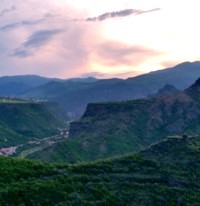Georgia
Kakheti
Conveniently close to the border with Azerbaijan is the Khareba winery.
Tunnels driven into a hillside provide a stable temperature, obviating the need for more technological temperature control, and the winery uses both the ancient wine making method and the more familiar modern process employing stainless steel vessels and oak barrels. We went to see it and have a taste. They produce a very acceptable drop at a competitive price-point. While each of the Caucasian countries we visited produce some good wines, we found the wines in Georgia to be the most price competitive.
Evidence of wine making, using fermented grape juice, can be found as early as 7,000 years ago in Georgia. The method used then was similar to the method still used here for some specialist wines. It employs a large clay vessel that is buried in the wine cellar up to its lip. The crushed grapes, skin seeds and all is placed into this and encouraged to ferment using plunger like tools to stir and separate the solids from the wine. When ready it's decanted into bottles and stored. Recent analysis of pottery vessels in France revealed that, in addition to making beer and mead, the ancient Celts were actually importing similar wine from Greece over 2,500 years ago.
Khareba Winery
In the traditional method a large vessel, like the one behind the singers, is set into the ground, like the one beneath my feet
The tasting tables can be seen down the adjoining tunnel
There are more images in the Georgia Album See more...

